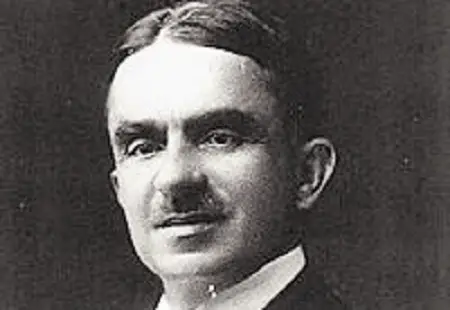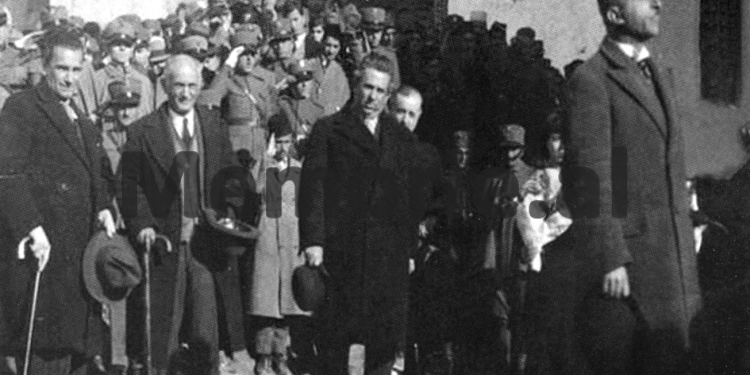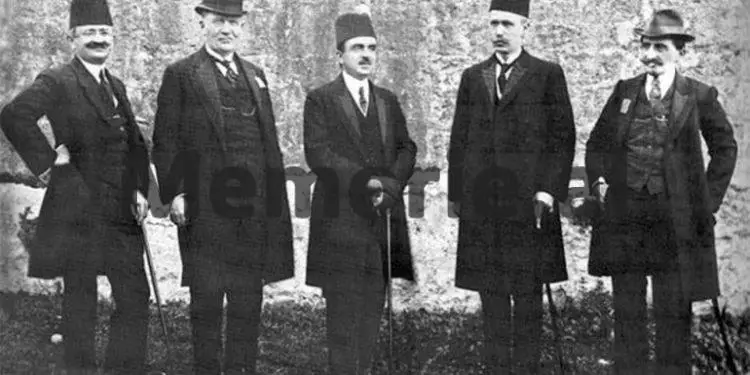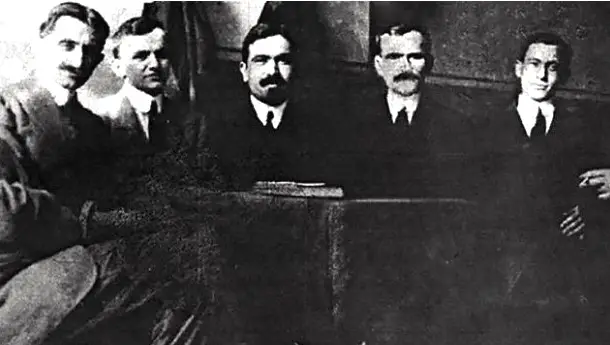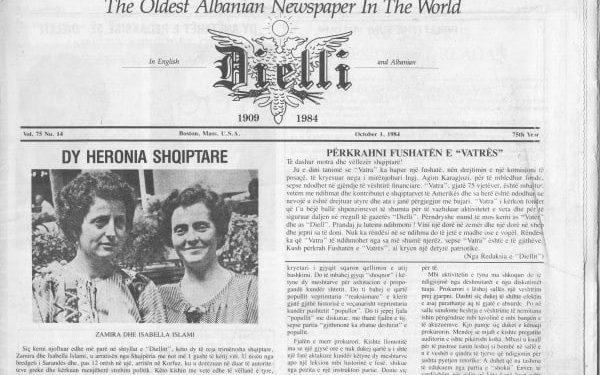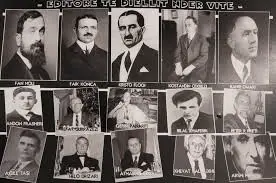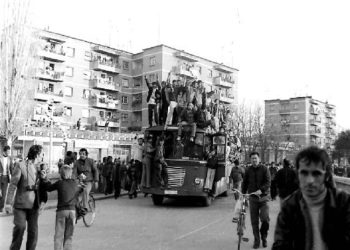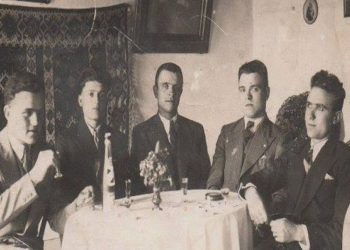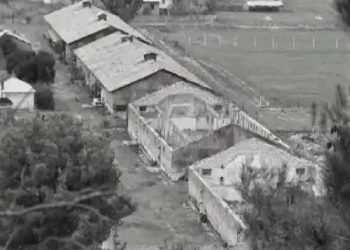Memorie.al/The patriot Kristo Floqi is the initiator of the creation of the Pan-Albanian Federation “Vatra” and is perhaps the only witness of the event who wrote his memoirs about it. These memoirs contain both facts and personal experiences of his relations with such great figures as Noli and Konitza, as well as factual evidence of this historical moment. These memoirs also contain friction and grudges, typical among Albanians, which perhaps led Kristo later to resign from the chairmanship. Noli, in the “Calendar” of “Vatra,” published in 1918, gives a telegraphic summary of the beginnings of “Vatra,” stating that: “On April 28, 1912, the Pan-Albanian Federation of America ‘VATRA’ was founded in the hall of the Boston Church, 227 Tremont Street, by the Societies ‘BESA-BESE,’ ‘FLAMURI I KRUJËS,’ ‘KOMBËTARE,’ and ‘DALLËNDYSHJA,’ under the chairmanship of Father Fan Noli.
The Provisional Committee was elected as follows: Secretary, Father Fan Noli, Treasurer, Lambí Çikozi, Organizers of the Branches, Faïk Bé Konitza and Kristo Floqi, Manager of ‘DIELLI’ Kristo Kirka, Inspectors of ‘DIELLI,’ Paskál Aleksi, Elia Tromara, Kosta Vasil. On July 14, 1912, the first Convention of the Federation was held at Lawrence Hall, 724 Washington Street, Boston, under the chairmanship of Mr. Lambi Kréshpani, and the first regular Committee of the Federation was elected as follows: General Secretary of ‘Vatra’ and Editor of ‘Dielli’ Faik Bé Konitza, Treasurer Lambi Çikozi, Controllers Kristo Floqi, Paskál Aleksi, Vangjél Gjika and Josíf Pani, and Manager of ‘DIELLI’ Kristo Kirka. This entire Convention held a second session on July 28 to vote on the budget, and a third session on August 11, where they accepted the demission of the controllers Kristo Floqi, Paskál Aleksi, and Vangjél Gjika and elected Messrs. Andrea Kristo, Koli Cakuaqi, and Father Fan Noli in their place.”
But here I bring the memoirs of Kristo Floqi, which were published in 1937 in the magazine “LEKA,” on the occasion of the 25th anniversary of Independence, as a sign of respect for him as the initiator and founder of the Federation, presenting it exactly as he wrote it and in the language of the time.
The Memoirs of Kristo Floqi on the Formation of the “Vatra” Federation
“The issue became very harsh, and a severe persecution began against us with imprisonments, internments, punishments, and other things, such that our lives became unbearable. Many nationalists were forced to flee at night by ships or boats, crossing the Adriatic, and some took to the mountains. Among these latter, I, the young man, was also compelled to go to Cakranj of Mallakastra, where we had our État-Major, under the leadership of Bektash Cakranji. But when we saw that it was impossible to stay even in the mountains anymore, we needed to disperse, so one fine morning, we woke up in Brindisi, with some comrades, and, since we saw that we had no hope of returning to the Homeland, we took the long road and after ten days, we had arrived in Boston, United States.
Naturally, in Boston, we could not practice law, but neither could we stay unemployed, so we moved to open a restaurant with Albanian clients, factory workers in Natick, Mass. But not four months passed, and our restaurant went bankrupt, because most of our clients dispersed, and necessity compelled us to traverse the United States and settle in the beautiful city of Salt Lake City, in the state of Utah, near California, where I had a brother-in-law, Mr. Kristo Poçi, who was engaged in some work there. I stayed there until September 20, 1911.
At that time, the famous Albanian society ‘BESA-BESEN’ of Boston, which had its propaganda organ ‘DIELLI,’ edited by Mr. Faik Konitza, under the title ‘DIELLI’ and ‘FLAMURI,’ was not getting along well with its editor. The Albanians were divided into two parties, of which the smaller party favored Mr. F. Konitza, while the other side, the majority, did not want him, so Mr. Konitza was forced to withdraw from the editorial office, which remained vacant.
The leadership of the ‘BESA-BESEN’ society then, especially two of its members, Messrs. Llambi Çikozi and Kolë Rodhja, addressed me and proposed the editing of ‘DIELLI’ with a monthly salary of 50 dollars, begging me to accept it. Although I had become involved in some fruitful work and had established a good basis for commercial earnings, I was compelled to accept that duty, and thus on September 20, 1911, I left my child in Salt Lake City and came to Boston, Mass, where the patriots of that city and the surrounding areas welcomed me very nicely and with unexpressed enthusiasm. The next day, I took over the editorship of ‘DIELLI.’
Compelled from the very first days to visit the various Albanian colonies of the United States, I began the first week to travel from village to village, holding conferences and encouraging Albanian patriots in the national propaganda, which at that time had taken a sufficient development and progress. The purpose of the conferences was especially for a general union among the various colonies, and precisely of some Albanian societies, with the same patriotic program, so that the antagonism they had with each other would cease, which was the cause of hindrances to the spread of national feelings, an obstacle that was further strengthened by the incessant intrigues of some of our patriots who fostered pro-Greek ideas to our detriment and that of the Nation.
I continued this goal with untiring ability and insistence, and I frequently trumpeted it through ‘DIELLI’ in a convincing way and with vivid reasons for more than three months and with over 100 conferences, until I ascertained that my efforts did not go in vain. The various colonies were finally convinced that a general union had to be made with one center, Boston. The historic day of December 11, 1911, marked a new era for the Albanians of America. On that day, hundreds of Albanians arrived in Boston, as delegates of various societies, and also as individuals. The wide hall of RATHBONNE was filled, so much so that many people were forced to stand, and hundreds of others remained outside.
At that meeting, Fan Noli also happened to be present, who had arrived from Russia those days, whereas Mr. Faik Konitza, despite the frequent and friendly invitations we made ourselves and with other friends, did not appear at that meeting, even though the society of Indiana (Gary-Indiana), called ‘SKENDERBEU,’ had nominated him as a representative and begged him to attend that important meeting. Mr. F. Konitza contented himself with sending me a letter, which was read at the meeting and its content was this:
Dear Mr. Floqi,
“I received your letter this afternoon and I return my thanks for the kind words of friendship and honor you express to me. Unfortunately, I am completely hindered on Sunday, nor did I know that you had a meeting this Sunday (although the day of the meeting was set in four issues of ‘Dielli’ and Mr. Konitza was sent the newspaper regularly) and he would invite me, and thus I got tied up elsewhere for the day after tomorrow. What you say about the union is agreeable, and undoubtedly it should be done if we find a proper formula, so that we can finish it without disrupting the work we have been dealing with until now with great difficulty. We have our committee, these (Flamuri i Krujës) and we do not see any reason to dissolve it. It is proper to dissolve irregular and unplanned work, but not work built with care. I believe you embrace these and agree with me.
I remain faithfully yours,
FAEK KONITZA d.v.
The meeting understood from this letter the intentions of Mr. F. Konitza, that he did not view such a Union favorably, for which he did not want to sacrifice the “Flamuri i Krujës” society formed by him, which numbered 10-12 members in total. Mr. Konitza did not want me to take the lead, which is why both he and Fan Noli always created obstacles for us. The Albanians there understood this, and I, in particular, occasionally dictated it to them through ‘DIELLI,’ our organ. —
Here we briefly note the societies that existed at that time in North America and which we tried to unite all of them. The societies were: The largest of all was the ‘BESA-BESEN’ society, followed by the ‘ARESIMI’ society of Korça, the ‘DALLENDYSHE’ society of New York, the ‘KOMBËTARE’ society of Worcester, the societies ‘MALLJ I MEMEDHEUT’ and ‘PERLINDJA’ of Jamestown, the ‘LIDHJA’ society, the ‘GJERGJ SKENDERBEU’ society, the ‘HYLLI AFERDITA’ society, the ‘BASHKIMI’ society, the ‘MIREBERESE’ society, the ‘PERPARIMI’ society, and Mr. F. Konitza’s committee, ‘FLAMURI I KRUJES.’
As soon as the list of incoming delegates was read, I, as the initiator of that meeting, proposed that a chairman be elected to preside over that meeting, as well as the other sessions that would take place later, and to honor Father Fan Noli, I proposed that he be elected as chairman, but Fan Noli explained and said that the chairmanship belonged to me, as the initiator of that meeting, who was also its organizer. The Assembly then unanimously elected me, and as secretary, the clever and capable patriot, Mr. Llambi Kreshpani. Thus, I opened the meeting, explaining in a long speech the history of our actions and the purpose of the meeting, and finally, I gave the floor in turn to the orators who wished to speak.
After several speeches were exchanged among the various orators, one of the dispatched delegates, Mr. Marko Adams, proposed that a commission of 4 people, the most distinguished among us, be elected, and as such, he designated Messrs. Fan Noli, Kristo Floqi, Faik Konitza, and Pascal Aleksi, and this commission, according to the explanations of the orator, would undertake the organization of a great Pan-Albanian Federation, with the agreement of all existing societies. Mr. Marko Adams’ proposal found unanimous approval and was met with cheers and applause. Thus that meeting concluded, and the burden was entrusted to the four of us, to communicate with each other and to establish the first foundations of a desired union, as well as the statute of the society.
The first decision we made, after gathering, was to appoint a secretary, with whom the opinions of the societies would be exchanged, and as such, they named Father Fan Noli, who accepted. Simultaneously, every society was also notified to send a fully empowered representative delegate to the center, to act together with us on behalf of the society that sent them. The first record we announced was this: The four undersigned, elected by the Assembly as a commission to find the path to a union of all Albanian societies in the United States of America, gathered and decided:
- To ask all societies and other colonies where societies do not exist, if they approve of a general union.
- How they desire the Union, in a centralized form, or as a Federation.
- With what kind of purpose they desire it, with a political, literary, or popular propaganda purpose.
- If they approve of this union, when they can elect their delegates to come to Boston and found the union. At the same time, we informed them that the Commission of Four elected Rev. Father Fan Noli as secretary with the address P. O. Box 2445, Boston, Mass, with whom the agreements would be made. We also informed them that the upcoming meeting would be held on March 3, 1912.
The Union Commission,
KONITZA, KR. FLOQI, AT FAN NOLI, P. ALEKSI.
A little later, these fully empowered representative delegates were elected:
For the ‘BESA-BESEN’ society, Mr. Llambi Çikozi, for the ‘MIREBERESE’ society, Rev. Father Naum Cerrja, for the ‘KOMBETARE’ society of Worcester, Mr. Kostika Treska, who was replaced by Kosta Vasili, for the ‘PERLINDJA’ and ‘MALLI i MEMEDHEUT’ societies of Jamestown, Mr. Kostaq Kotta, for the ‘DALLENDYSHJA’ society of New York and ‘ARESIMI’, Kristo Kirka, and for the ‘FLAMURI i KRUJES’ committee, Mr. Elia Tromarra:
In a meeting held on March 24, 1912, it was decided to create the Statute of the Society, the purpose of which would be popular propaganda. Now the embryo of the Federation was missing, and thus we all gathered, organizers and delegates, to find the embryo and baptize the society. Each of us proposed a name, one the name ‘PLOUGH,’ one ‘HARROW,’ another proposed the name ‘KASTRIOTI,’ another the name ‘SKENDERBEU,’ another proposed the name ‘PERLINDJA,’ and so on, but none of them found the necessary approval. Finally, Fan Noli threw the name ‘VATRA’ (Hearth) among us. We looked each other in the eye, not that the name was bad, but it somehow didn’t strike us well in the ear, but Fan Noli, with his eloquence, gave us some clarifying and other significant explanations, and thus convinced all of us, and we accepted it unanimously with cheers and applause. Thus, our great Society took the title PAN-ALBANIAN FEDERATION ‘VATRA.’ Based on this, the Statute, signed by all, was also presented, which was read with great care, debated and discussed well, and accepted, keeping a record which all of us, organizers and delegates, signed.
The day of April 28, 1912, was the last day of discussions for ‘VATRA,’ and this day can be called “the historical day of the creation of ‘VATRA,'” which served the Homeland so much in the dangerous times that followed later, services that were truly patriotic and will never be forgotten. The record of April 28, 1912, which was the IXth record, contained the election of the Elders of ‘VATRA.’ As such Elders, Messrs. Fan Noli, Llambi Çikozi, and Kristo Kirka were unanimously elected. As organizers for the formation of the different branches of the Federation, Messrs. Faik Konitza and Kristo Floqi were elected, and as controllers, Messrs. Paskal Aleksi, Elia Tromara, and Kosta Vasili were elected.
But the most difficult and challenging work now belonged to the organizers, because these two had to go from branch to branch, and colony to colony, to convince most people to join the Federation as members, they would be organized according to the understanding of the society and elect the eldership of each branch or colony. Every organizer also had to hold a long conference, explaining the purposes of the Federation, but in a way that one organizer would not deviate from the other in the theme he would develop, because the words had to have a common meaning. And so it was done.
When Mr. Faik Konitza and I were gathered to divide and organize the different colonies and branches between us, Fan Noli was also present. Mr. Konitza himself chose those colonies or branches that were more consolidated and more numerous in members, and also safer to organize, while he left me the most numerous and most difficult ones, where there were elements with all sorts of minds, whom it was not easy to lead, because in most of these colonies there were also many pro-Greek Albanians, who used whatever came to their minds and whatever they could to prevent their comrades from becoming members of the VATRA society.
Despite this, I did not object to Mr. Konitza, so that no disagreement would arise and the work would not be ruined. Thus, Mr. Konitza chose these branches: of Lynn, of Worcester, of Manchester, of Southbridge, and of Central Falls. Fan Noli, as the friend and co-worker of Mr. Konitza, offered to organize, together with the masses he would hold in the churches, the branches of Boston, Natick, and Cochituate. They left me: The branches of Milford, So. Framingham, Marlboro, Hudson, Taunton, New Bedford, Biddeford Me., Saco Ale, Lewiston, Sanford, Augusta. N. H., Concord N. H., Franklin, Penacook, and several other smaller ones, where 3-4 colonies had to be combined into one, because the members were not complete, for the reason that every branch that was to be formed had to have at least 21 members, while in these second-rate colonies, I had to meet sometimes 4, sometimes 6, and sometimes fewer members, and thus it was necessary to concentrate all of them in one village or city, forming one branch.
And these were the biggest difficulties for me, but despite everything, I did not despair, but took on the work. Finally, we organized all of them, but what we suffered, and especially me, only God knows. Thus the work of ‘VATRA’ went very well up to this point, and continued well until July 14, 1912. The ‘VATRA’ Federation, according to the Statute, would be led by a secretary and not a chairman, which secretary would be charged with the same duties and rights as the chairman could have, and he would be paid 20 dollars per month.
In particular, since through the Statute the newspaper ‘DIELLI,’ the organ of ‘VATRA,’ would also be under the control of the Society, and also the editor of ‘DIELLI’ would be paid as always, but now by the Federation, and not as before by the ‘BESA-BESEN’ society, which was merged, like the others, into the ‘VATRA’ Federation, therefore the General Assembly of the Federation, which consisted of the chairmen of all branches and colonies, now had to definitively elect the entire leadership of the Federation for one year, meaning its operational bodies, which were, as we said, the secretary, the editor of ‘Dielli,’ the manager of ‘Dielli,’ the treasurer, and the commission or controllers of the Federation. Until then, Fan Noli was the secretary, who was temporarily elected by us in the formation of ‘VATRA,’ and I was the editor and director of ‘DIELLI.’
Mr. Konitza, in this three-month period that passed, from April 28 until July 14, which we are discussing, used every means to campaign among the chairmen of the different branches who would vote, so that he would become this secretary of the Federation, because he was also financially constrained and suffered quite a bit, I observed these actions of Mr. Faik Konitza, but I had no reason to worry, because I had the editorial office of ‘Dielli’ and could live with my family (because I also had my family there in Boston, where they lived together with the current prime minister, Mr. Koço Kotta, and his wife), and therefore, not only did I not cause any hindrance to Mr. Konitza in these actions and efforts, but on the contrary, I helped him myself, advising the chairmen of the branches and my special friends, to help him and even elect him as secretary, so that he could also live like us, since Fan Noli was also a priest and did not need to become the secretary of the Federation. It did not bother me if he was the secretary, meaning the chairman of ‘VATRA,’ and I the editor of the newspaper, as long as the work went well./Memorie.al




